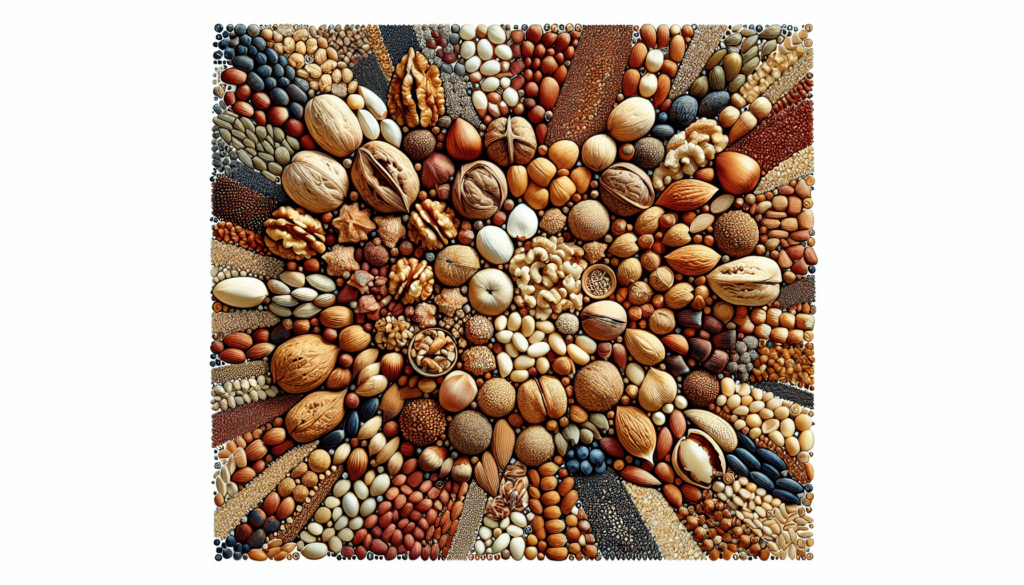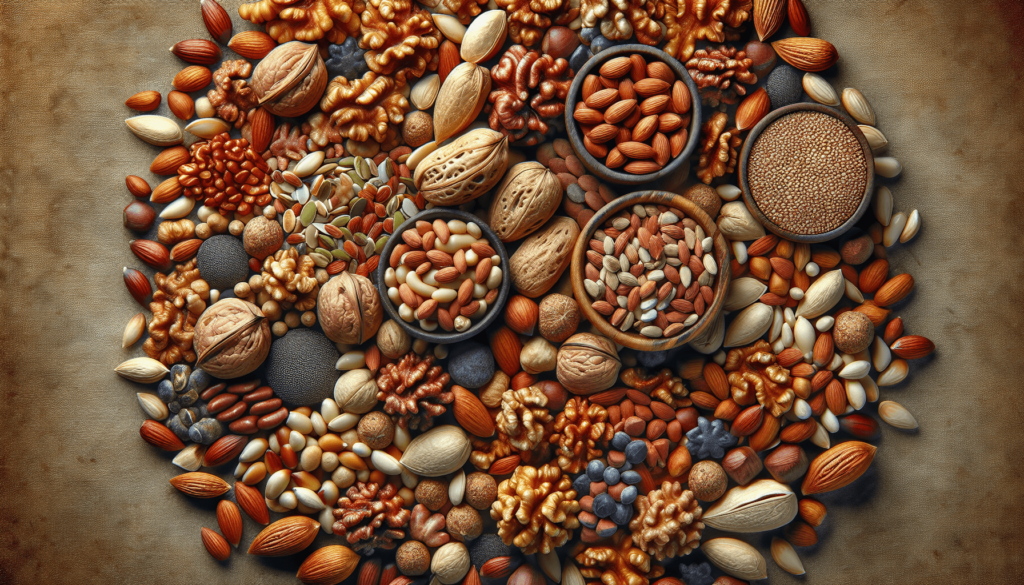In the quest for a healthy gut, you may have heard about the importance of a diverse gut microbiome. But did you know that nuts and seeds can play a significant role in promoting this diversity? These tiny powerhouses are packed with essential nutrients that not only nourish our bodies but also provide a feast for our gut bacteria. From almonds to chia seeds, this article will explore how nuts and seeds contribute to the diversity of our gut microbiome, ultimately leading to improved digestion and overall well-being. So grab a handful of your favorite nuts, and let’s dig into the fascinating world of gut health!
Introduction
Welcome! In this article, we will explore the fascinating world of the gut microbiome and its importance in maintaining our overall health. We will specifically delve into the role that nuts and seeds play in promoting gut microbiome diversity. The gut microbiome is a complex community of bacteria, viruses, fungi, and other microorganisms that reside in our digestive tract. These microorganisms, collectively known as the gut microbiota, have a profound impact on our well-being, and maintaining a diverse gut microbiome is crucial for optimal health. Let’s dive in and learn more!
What is the gut microbiome?
Definition of gut microbiome
The gut microbiome refers to the vast ecosystem of microorganisms that resides in our gastrointestinal tract. It contains trillions of microorganisms, including bacteria, viruses, fungi, and archaea, which coexist in a delicate balance. These microbes interact with each other and with our bodies, playing a crucial role in digestion, nutrient absorption, immune function, and even mental health.
Importance of gut microbiome
A healthy gut microbiome is essential for our overall well-being. The gut microbiota helps break down food, produce vitamins, metabolize drugs, regulate inflammation, and train the immune system. In recent years, research has shown that an imbalanced or less diverse gut microbiome is associated with various health issues, including obesity, inflammatory bowel disease, allergies, and even mental disorders like depression and anxiety. Maintaining a diverse gut microbiome is vital for promoting good health and preventing these conditions.

What is gut microbiome diversity?
Definition of gut microbiome diversity
Gut microbiome diversity refers to the variety of different microorganisms that reside in our gut. It is an indicator of the richness and abundance of different microbial species present in the gastrointestinal tract. A diverse gut microbiome consists of a wide array of bacterial species, each contributing uniquely to our overall health. On the other hand, a less diverse gut microbiome is characterized by a reduction in the number and variety of microbial species.
Significance of gut microbiome diversity
Having a diverse gut microbiome is crucial for maintaining optimal health. A diverse microbiome provides a vast array of functional capabilities, allowing for effective digestion, nutrient processing, and defense against harmful pathogens. Studies have shown that a less diverse gut microbiome is associated with various health conditions, including obesity, allergies, autoimmune diseases, and even certain cancers. Therefore, promoting and preserving gut microbiome diversity is essential for overall well-being.
Role of nuts and seeds in gut microbiome diversity
Now let’s explore how nuts and seeds contribute to gut microbiome diversity. Nuts and seeds are nutrient-rich foods that have long been recognized for their health benefits. Not only are they a great source of essential nutrients, but they also contain specific components that promote the growth and diversity of beneficial gut bacteria.

Nutritional content of nuts and seeds
Fiber content
Nuts and seeds are excellent sources of dietary fiber, a type of carbohydrate that our bodies cannot digest. Dietary fiber passes through the digestive tract largely intact, reaching the colon, where it serves as a food source for our gut bacteria. This fiber acts as a prebiotic, promoting the growth of beneficial bacteria and stimulating gut microbiome diversity.
Protein content
Additionally, nuts and seeds are rich in protein. Protein is essential for building and repairing tissues in the body, and it also plays a significant role in supporting a healthy gut microbiome. Some bacteria in our gut rely on protein as a source of energy, and a diet rich in high-quality proteins from nuts and seeds can support the growth and diversity of beneficial gut bacteria.
Healthy fats
Nuts and seeds are also packed with healthy fats, such as monounsaturated and polyunsaturated fats. These fats have been associated with numerous health benefits, including a reduced risk of heart disease and improved brain function. Recent research has shown that these healthy fats can have a positive impact on the gut microbiome by promoting the growth of beneficial bacteria and supporting gut health.
Vitamins and minerals
Nuts and seeds are nutritional powerhouses, containing a wide range of vitamins and minerals. These include vitamin E, magnesium, zinc, and selenium, among others. These micronutrients are essential for maintaining a healthy gut microbiome, as they provide the necessary cofactors for the function and growth of beneficial bacteria.
Prebiotic properties of nuts and seeds
Definition of prebiotics
Prebiotics are a type of dietary fiber that stimulates the growth or activity of beneficial bacteria in the gut. They are not digested by human enzymes, and instead, pass through the digestive tract intact, reaching the colon, where they act as a food source for our gut bacteria. By nourishing these beneficial bacteria, prebiotics promote gut microbiome diversity and support overall gut health.
Types of prebiotic fibers in nuts and seeds
Many nuts and seeds contain specific types of dietary fiber that act as prebiotics. For example, almonds are rich in dietary fiber, including soluble fibers like pectin and resistant starch, which have prebiotic effects. Chia seeds are another example, as they are an excellent source of soluble fiber, promoting the growth of beneficial bifidobacteria in the gut. These prebiotic fibers nourish and support the growth of beneficial gut bacteria, enhancing gut microbiome diversity.
Impact on gut microbial composition
Increase in beneficial bacteria
Consuming nuts and seeds has been shown to increase the abundance of beneficial bacteria in the gut. Studies have demonstrated that regular consumption of nuts and seeds, such as walnuts and flaxseeds, can lead to an increase in beneficial bacteria like Bifidobacterium and Lactobacillus. These bacteria play important roles in maintaining gut health, improving digestion, and supporting overall well-being.
Promotion of diversity
Not only do nuts and seeds increase the abundance of beneficial bacteria, but they also promote gut microbiome diversity. Research has shown that a diet rich in nuts and seeds can increase the diversity of gut bacteria, allowing for a more balanced and functional gut microbiome. This diverse microbial community is better equipped to perform essential functions like nutrient processing, immune regulation, and inflammation control.
Effects on gut microbiome metabolites
Short-chain fatty acids
When our gut bacteria digest dietary fiber, they produce short-chain fatty acids (SCFAs) as metabolic byproducts. These SCFAs, such as acetate, propionate, and butyrate, are essential for gut health. Nuts and seeds, with their high fiber content, can promote the production of SCFAs in the gut, leading to improved gut function, reduced inflammation, and enhanced overall health.
Secondary metabolites
In addition to SCFAs, nuts and seeds also contain various secondary metabolites, which are bioactive compounds produced by the plants themselves. These secondary metabolites, including phytochemicals and antioxidants, can have positive effects on gut health and the gut microbiome. For example, polyphenols found in nuts and seeds have been shown to have anti-inflammatory and antioxidant properties, supporting a healthy gut microbiome and overall well-being.
Anti-inflammatory properties
Reduction of gut inflammation
Inflammation in the gut is a common underlying factor in many gastrointestinal disorders. Fortunately, nuts and seeds possess anti-inflammatory properties that can help reduce gut inflammation. These anti-inflammatory effects are attributed to their rich content of omega-3 fatty acids, phytochemicals, and antioxidants. By reducing gut inflammation, nuts and seeds contribute to a healthier gut environment, promoting gut microbiome diversity.
Modulation of immune response
The gut microbiome has a close relationship with our immune system, and an imbalance in the gut microbiota can result in an overactive or dysregulated immune response. Nuts and seeds, with their diverse array of nutrients and bioactive compounds, can help modulate the immune response in the gut. By promoting a balanced immune response, nuts and seeds support gut microbiome diversity and overall gut health.
Conclusion
In conclusion, maintaining a diverse gut microbiome is crucial for optimal health, and nuts and seeds can significantly contribute to this diversity. Their high fiber content, prebiotic properties, nutritional profile, and anti-inflammatory effects make them valuable allies in supporting a healthy gut microbiome. By incorporating a variety of nuts and seeds into your diet, you can nourish and enhance the diversity of your gut microbiome, promoting overall wellness and vitality. So go ahead, enjoy a handful of nuts and seeds today, and reap the benefits of a diverse gut microbiome!

